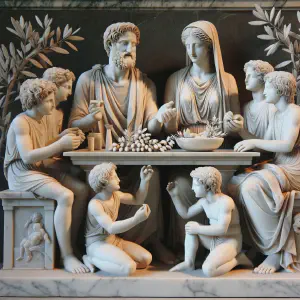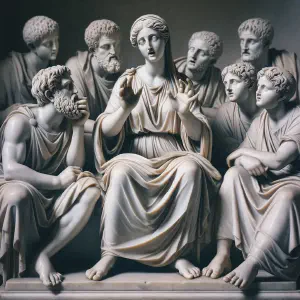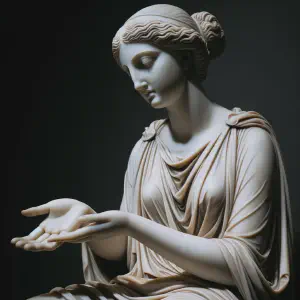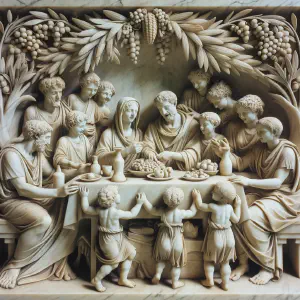The Fruits of Faithfulness



Years passed, and the family’s faithfulness bore fruit. The children grew into adults who feared the Lord, their lives rich in love and service. Eliana and Josiah, now old, saw the prosperity of their lineage and the impact of their teachings. As they sat at their table, surrounded by generations of faithful, the fruits of their handiwork evident, they knew they had lived a life pleasing to the Lord. In their hearts, they echoed the psalmist’s words, “Blessed are those who fear the Lord,” a mantra that had guided their journey through life’s seasons.
Five Questions
What does the story of Eliana and Josiah teach us about the value of a virtuous life, especially in relation to the scripture from Proverbs?
The story of Eliana and Josiah beautifully encapsulates the essence of Proverbs 31. It shows that the true worth of a person, particularly a woman, lies not in external beauty or charm but in her fear of the Lord and her virtuous actions. Just like the woman described in Proverbs, Eliana’s value is depicted as far beyond pearls, highlighted through her selfless actions, hard work, and the loving care she provides for her family and the needy.
How does the theme of stewardship in the Parable of the Talents relate to the lives of Eliana and Josiah?
In the Parable of the Talents, the master rewards the servants who diligently and wisely invested the talents given to them. This directly parallels Eliana and Josiah’s lives. They embody the idea of stewardship by nurturing and growing their God-given gifts – be it their children, their skills, or their capacity to serve others. They don’t hide their talents but use them to bear fruit, much like the servants who multiplied their talents.
What role does the Psalm 128 play in the story, and how does it reflect in the family life of Eliana and Josiah?
Psalm 128 celebrates the blessings of those who fear the Lord and walk in His ways, and this is vividly reflected in Eliana and Josiah’s life. Their home, filled with love, faith, and prosperity, is a direct manifestation of the Psalm’s promises. The imagery of the wife as a fruitful vine and children as olive plants around the table is beautifully mirrored in their harmonious and blessed family life.
How does the message from 1 Thessalonians about being children of light and day apply to the story’s characters and their actions?
The message from 1 Thessalonians emphasizes living as children of light and day, staying alert and sober. Eliana and Josiah exemplify this through their active and conscious living. They are always awake to the needs of others, sober in their judgments, and shine as beacons of light through their deeds. Their life is a testament to living in awareness and readiness, embodying the teachings of being children of light.
In what ways does the story, “The Fruits of Faithfulness,” capture the essence of Jesus’ teachings in the Gospels, particularly the message of bearing fruit by remaining in Him?
“The Fruits of Faithfulness” captures the essence of Jesus’ teachings by illustrating how living a life deeply rooted in faith and the fear of the Lord leads to bearing much fruit. Eliana and Josiah’s lives are testaments to remaining in Christ, as they actively engage in acts of kindness, steward their responsibilities well, and nurture a faith-filled family. Their fruitful lives, blessed with prosperity and spiritual richness, embody the call to remain in Christ and bear abundant fruit, as per Jesus’ teachings in the Gospels.
Bible Study
Proverbs 31:10-13, 19-20, 30-31
When one finds a worthy wife,
her value is far beyond pearls.
Her husband, entrusting his heart to her,
has an unfailing prize.
She brings him good, and not evil,
all the days of her life.
She obtains wool and flax
and works with loving hands.
She puts her hands to the distaff,
and her fingers ply the spindle.
She reaches out her hands to the poor,
and extends her arms to the needy.
Charm is deceptive and beauty fleeting;
the woman who fears the LORD is to be praised.
Give her a reward for her labors,
and let her works praise her at the city gates.
This passage describes the ideal qualities of a virtuous wife, emphasizing her diligence, kindness, and fear of the Lord. The text aligns with Catholic values by promoting the dignity of women, the sanctity of marriage, and acts of mercy, particularly in her outreach to the poor. It reflects the Catholic understanding of grace as it highlights the intrinsic value and worth of living a life rooted in faith and good works.
Psalm 128:1-2, 3, 4-5
R. (cf. 1a) Blessed are those who fear the Lord.
Blessed are you who fear the LORD,
who walk in his ways!
For you shall eat the fruit of your handiwork;
blessed shall you be, and favored.
R. Blessed are those who fear the Lord.
Your wife shall be like a fruitful vine
in the recesses of your home;
Your children like olive plants
around your table.
R. Blessed are those who fear the Lord.
Behold, thus is the man blessed
who fears the LORD.
The LORD bless you from Zion:
may you see the prosperity of Jerusalem
all the days of your life.
R. Blessed are those who fear the Lord.
Psalm 128 is a song of ascent, praising those who fear the Lord and walk in His ways. It illustrates the blessings bestowed upon the faithful, depicting a fruitful family life. This aligns with Catholic values of family unity, the importance of faith in daily life, and the rewards of living in accordance with God’s commandments. The passage resonates with the Catholic teachings on the domestic church and the blessings that come from a life of piety and devotion.
1 Thessalonians 5:1-6
Concerning times and seasons, brothers and sisters,
you have no need for anything to be written to you.
For you yourselves know very well that the day of the Lord will come
like a thief at night.
When people are saying, “Peace and security, "
then sudden disaster comes upon them,
like labor pains upon a pregnant woman,
and they will not escape.But you, brothers and sisters, are not in darkness,
for that day to overtake you like a thief.
For all of you are children of the light
and children of the day.
We are not of the night or of darkness.
Therefore, let us not sleep as the rest do,
but let us stay alert and sober.
Paul’s letter to the Thessalonians focuses on preparedness for the Day of the Lord. It emphasizes the contrast between those who live in light (symbolizing awareness and readiness) and those in darkness (symbolizing ignorance and unpreparedness). This passage aligns with Catholic teachings on the importance of vigilance, moral integrity, and living in a state of grace. It underscores the Catholic understanding of eschatology and the call to be ever mindful of Christ’s second coming.
Matthew 25:14-30
Jesus told his disciples this parable:
“A man going on a journey
called in his servants and entrusted his possessions to them.
To one he gave five talents; to another, two; to a third, one–
to each according to his ability.
Then he went away.
Immediately the one who received five talents went and traded with them,
and made another five.
Likewise, the one who received two made another two.
But the man who received one went off and dug a hole in the ground
and buried his master’s money.“After a long time
the master of those servants came back
and settled accounts with them.
The one who had received five talents came forward
bringing the additional five.
He said, ‘Master, you gave me five talents.
See, I have made five more.’
His master said to him, ‘Well done, my good and faithful servant.
Since you were faithful in small matters,
I will give you great responsibilities.
Come, share your master’s joy.’
Then the one who had received two talents also came forward and said,
‘Master, you gave me two talents.
See, I have made two more.’
His master said to him, ‘Well done, my good and faithful servant.
Since you were faithful in small matters,
I will give you great responsibilities.
Come, share your master’s joy.’
Then the one who had received the one talent came forward and said,
‘Master, I knew you were a demanding person,
harvesting where you did not plant
and gathering where you did not scatter;
so out of fear I went off and buried your talent in the ground.
Here it is back.’
His master said to him in reply, ‘You wicked, lazy servant!
So you knew that I harvest where I did not plant
and gather where I did not scatter?
Should you not then have put my money in the bank
so that I could have got it back with interest on my return?
Now then! Take the talent from him and give it to the one with ten.
For to everyone who has,
more will be given and he will grow rich;
but from the one who has not,
even what he has will be taken away.
And throw this useless servant into the darkness outside,
where there will be wailing and grinding of teeth.’”
The Parable of the Talents in Matthew’s Gospel stresses the importance of using one’s God-given gifts for the kingdom of God. The characters, a master and his servants, represent God and His followers, respectively. The passage reinforces Catholic values of stewardship, responsibility, and the proper utilization of one’s talents and resources for God’s glory. It aligns with the Catholic teachings on the necessity of active participation in faith and the consequences of neglecting to use one’s gifts for the common good.
Lessons
The readings encompass a profound message of faithfulness, service, and vigilant stewardship. They teach us the invaluable worth of a virtuous life, emphasizing that true value lies not in external charm or beauty, but in fearing the Lord and engaging in selfless acts of kindness. The importance of using one’s God-given talents for the good of others is highlighted, warning against complacency and fear-induced inaction. The passages also underscore the significance of family as a cornerstone of a blessed and faithful life, where the nurturing of faith and virtues ensures a legacy of spiritual richness. In essence, these scriptures guide us to lead lives that are awake, alert, and abundant in service, mirroring the teachings of Christ.
Meditation Prayer


